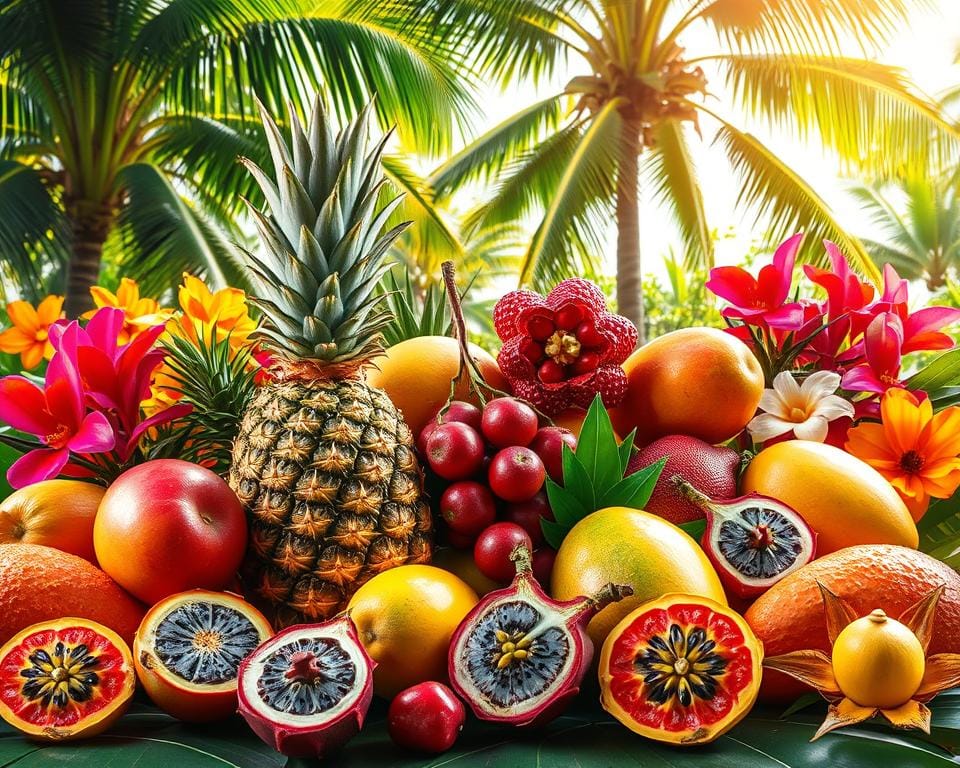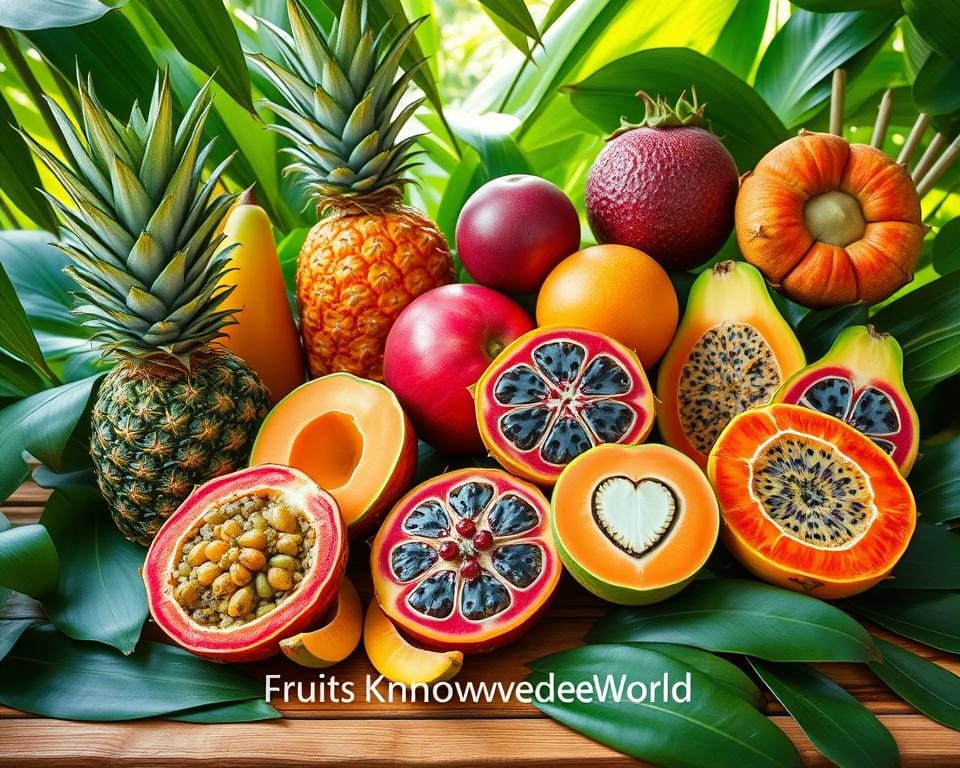Tropical fruits are key for a healthy lifestyle. They grow best in warm and moist climates. This includes places like Asia, Africa, and parts of America and the Caribbean.
These fruits are packed with vitamins. They have fiber, vitamin C, potassium, and antioxidants. Adding them to your diet can boost your health. Just 1.5-2.5 cups a day can strengthen your immune system and help your heart.
Plus, they add exciting, exotic tastes to your food. This makes meals both tasty and good for you.
Key Takeaways
- Tropical fruits are rich in essential vitamins and minerals.
- These fruits are high in dietary fiber, aiding digestion and blood sugar regulation.
- They contain antioxidants that can reduce the risk of chronic diseases.
- They offer unique flavors and vibrant colors, enhancing meal appeal.
- Consuming tropical fruits can support overall immune health due to their high vitamin C content.
- Enzymes in tropical fruits like papayas aid in digestion and nutrient absorption.
- Hydration benefits are significant due to the high water content in fruits like watermelon and coconut.
What Are Tropical Fruits?
Tropical fruits grow in warm, humid areas near the Equator. They are known for their bright colors, rich smells, and juicy flavors.

Definition and Characteristics
Tropical fruits come in many types. They are famous for their vivid colors, intense flavors, and nutritional value. Fruits like mangoes, oranges, and pineapples are good examples.
These fruits have different textures and tastes. They are full of vitamins, minerals, and antioxidants. This helps promote a healthy diet.
Growing Regions
Tropical fruits mainly grow in the tropics. This includes places in Asia, Africa, the Americas, and Oceania. Countries such as Brazil, Thailand, and India are leaders in tropical fruit farming.
For example, dragon fruit is from Southern Mexico and Central America. Passion fruit comes from South America. Meanwhile, rambutan does well in Southeast Asia and Hawaii. Acai berries originate from the Amazon rainforest.
Popular Varieties
The tropical fruit category features many kinds, from common to exotic. Popular ones include:
- Mangoes: Renowned for their sweet and juicy flesh.
- Papayas: Valued for their rich, tropical flavor and health benefits.
- Pineapples: Prized for their tangy and sweet taste.
- Bananas: A staple in many homes, especially the Cavendish kind.
Jackfruit and dragon fruit are also remarkable. Jackfruit has a unique texture and taste. Dragon fruit stands out for its bright color and kiwi-like flavor. In the United States, bananas are very popular. 96% of American households bought them in the past 30 days.
Health Benefits of Tropical Fruits
Tropical fruits taste great and are full of health perks for a balanced diet. They offer key nutrients, which help many body functions and boost health.
Boosting Immunity
Tropical fruits are rich in vitamin C and antioxidants, making your immune system stronger. Oranges, mangoes, and guavas are top picks for keeping you healthy. They have essential nutrients that protect against infections and illnesses.
Improving Digestion
Papayas, dragon fruits, and pineapples have lots of fiber, aiding digestion and gut well-being. These fruits include both types of fibers, helping with nutrient uptake and consistent bowel movement.
Promoting Heart Health
Bananas, avocados, and guavas boost heart health with their nutrient mix. They’re rich in potassium, fiber, and vitamins that manage blood pressure, cut cholesterol, and support the heart.
Anti-Inflammatory Properties
Fruits like pineapples and strawberries have anti-inflammatory benefits. They’re packed with enzymes, polyphenols, and antioxidants. These substances fight inflammation and aid various body systems’ health.
Popular Tropical Fruits and Their Nutritional Value
Check out the health benefits of tropical fruits, each packed with special nutrients. Let’s explore some well-known fruits and what they offer.
Mango
Mangoes are full of vitamin C, with 60.1 mg in each cup. That’s 67% of what you need daily. They’re great for your immune system. To dive deeper into what makes these fruits so good, visit this tropical fruit resource.
Papaya
Papayas are loaded with vitamin C too, offering 88.3 mg per cup. This is 98% of your daily needs. They also contain antioxidants like carotenoids. These help keep you healthy and fight diseases.
Pineapple
A cup of pineapple has 78.9 mg of vitamin C, which is 88% of your daily needs. It also has bromelain, a unique enzyme. Bromelain fights inflammation, making pineapple both tasty and beneficial.
Bananas
Bananas provide 3.07 grams of fiber per fruit. This fiber is important for your digestion and gut health. Eating bananas helps you maintain a healthy digestive system, vital for everyday life.
Avocado
Avocados are known for their healthy fats and fiber. One cup of avocado has 10 grams of fiber, or 35% of your daily needs. These fats support your heart and help manage cholesterol. For more info, see this comprehensive guide to tropical fruit nutrition.

| Fruit | Vitamin C (mg per cup) | % Daily Value (DV) |
|---|---|---|
| Mango | 60.1 | 67% |
| Papaya | 88.3 | 98% |
| Pineapple | 78.9 | 88% |
| Banana | 3.07 grams (fiber) | 11% (fiber) |
| Avocado | 10 grams (fiber) | 35% (fiber) |
How to Include Tropical Fruits in Your Diet
Adding tropical fruits to your diet is both fun and good for you. Their natural sweetness and bold flavors fit well in many dishes. This makes it easy to eat enough fruit every day. Here are tips for adding tropical fruits to your meals:
Start your day by putting tropical fruits in your breakfast. Add mango, papaya, or pineapple to your yogurt or cereal. These fruits boost the taste and pack your meal with nutrients.
Making smoothies is a great way to use fruits in a creative way. Mix fruits like bananas, guava, and mangosteen with spinach and a little coconut water. You’ll get a tasty drink full of nutrition. Mango and papaya, for example, are full of vitamin C and other antioxidants.
Salads are perfect for adding these fruits. Mix dragon fruit, rambutan, and lychee for a tropical fruit salad. Their unique textures and tastes make salads exciting and healthy. Fruits like lychee are known for their health benefits, including antioxidants and weight loss support.
For dinner, use tropical fruits in your main courses or as sides. Grilled tilapia with a pineapple salsa tastes great and is healthy. Or, make a mango slaw for a fresh side with grilled meats.
If you love sweets, tropical fruits are an excellent choice for desserts. Make a light fruit dip with fresh pineapple, as Taste of Home Test Kitchen in Milwaukee, Wisconsin, suggests. Or try a banana skillet dessert with maraschino cherries for a treat that’s both sweet and wholesome, recommended by Terri Merritts from Nashville, Tennessee.
And don’t forget to enjoy these fruits by themselves. Eating a ripe mango or fresh guava is a simple way to add fruit to your diet. This easy approach helps you satisfy sweet urges and gain the health benefits of these exotic fruits.
| Fruit | Benefits | Popular Dishes |
|---|---|---|
| Mango | Rich in vitamins, antioxidants | Smoothies, salads, slaws |
| Pineapple | Aids digestion, boosts immunity | Fruit dip, salsa, grilled dishes |
| Guava | High in vitamins, dietary fiber | Yogurt topping, smoothies |
| Rambutan | High in antioxidants, dietary fibers | Fruit salads, desserts |
| Dragon Fruit | Low-calorie, rich in vitamin C | Salads, smoothie bowls, snacks |
Adding tropical fruits to your diet offers many flavors and textures while covering your nutritional needs. The trick is to stay simple and inventive with these delightful fruits.
Conclusion
Adding tropical fruits to your meals is a great idea. They are not just tasty but also packed with health benefits. Fruits like mangoes, avocados, and passionfruit can improve your health a lot.
Eating these exotic fruits can really change your health for the better. They are full of important nutrients. These help with your immune system, digestion, heart health, and reducing inflammation. There are more of these fruits available now than ever before.
You can enjoy these fruits fresh all year by knowing their peak seasons. For example, mangoes are best from May to September. Avocados are prime from June to September. This timing makes them great for adding to your diet. The market for fresh fruits in the US is growing fast. It’s expected to reach $40.71 billion by 2024. This growth means these healthy fruits will be easy to find.
Tropical fruits are not only varied but also full of good stuff like vitamins and fiber. They are easy to add to all kinds of food. This makes your meals more interesting and good for you. By trying different tropical fruits, you can make eating healthy exciting.



